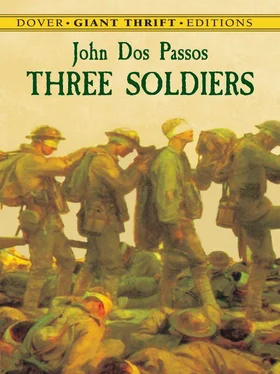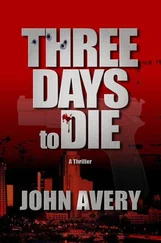“Oh, yes, but nobody expects you to do any tricks with it. You can certainly make it intelligible. That’s all I want.”
“I have my doubts.”
Andrews sipped his tea slowly, looking now and then at Geneviève Rod who had suddenly begun talking very fast to Ronsard. She held a cigarette between the fingers of a long thin hand. Her large pale-brown eyes kept their startled look of having just opened on the world; a little smile appeared and disappeared maliciously in the curve of her cheek away from her small firm lips. The older woman beside her kept looking round the table with a jolly air of hospitality, and showing her yellow teeth in a smile.
Afterwards they went back to the sitting room and Andrews sat down at the piano. The girl sat very straight on a little chair beside the piano. Andrews ran his fingers up and down the keys.
“Did you say you knew Debussy?” he said suddenly.
“I? No; but he used to come to see my father when I was a little girl… I have been brought up in the middle of music… That shows how silly it is to be a woman. There is no music in my head. Of course I am sensitive to it, but so are the tables and chairs in this apartment, after all they’ve heard.”
Andrews started playing Schumann. He stopped suddenly.
“Can you sing?” he said. “No.”
“I’d like to do the Croses Lyriques… I’ve never heard them.”
“I once tried to sing de Soir,” she said.
“Wonderful. Do bring it out.”
“But, good Lord, it’s too difficult.”
“What is the use of being fond of music if you aren’t willing to mangle it for the sake of producing it?… I swear I’d rather hear a man picking out Auprès de ma Blonde on a trombone than Kreisler playing Paganini impeccably enough to make you ill.”
“But there is a middle ground.”
He interrupted her by starting to play again. As he played without looking at her, he felt that her eyes were fixed on him, that she was standing tensely behind him. Her hand touched his shoulder. He stopped playing.
“Oh, I am dreadfully sorry,” she said.
“Nothing. I had finished.”
“You were playing something of your own?”
“Have you ever read La Tentation de Saint Antoine?” he asked in a low voice.
“Flaubert’s?”
“Yes.”
“It’s not his best work. A very interesting failure though,” she said.
Andrews got up from the piano with difficulty, controlling a sudden growing irritation.
“They seem to teach everybody to say that,” he muttered.
Suddenly he realized that other people were in the room. He went up to Mme. Rod.
“You must excuse me,” he said, “I have an engagement… Aubrey, don’t let me drag you away. I am late, I’ve got to run.”
“You must come to see us again.”
“Thank you,” mumbled Andrews.
Geneviève Rod went with him to the door. “We must know each other better,” she said. “I like you for going off in a huff.”
Andrews flushed.
“I was badly brought up,” he said, pressing her thin cold hand. “And you French must always remember that we are barbarians… Some are repentant barbarians… I am not.”
She laughed, and John Andrews ran down the stairs and out into the grey-blue streets, where the lamps were blooming into primrose color. He had a confused feeling that he had made a fool of himself, which made him writhe with helpless anger. He walked with long strides through the streets of the Rive Gauche full of people going home from work, towards the little wine shop on the Quai de la Tournelle.
It was a Paris Sunday morning. Old women in black shawls were going into the church of St. Etienne-du-Mont. Each time the leather doors opened it let a little whiff of incense out into the smoky morning air. Three pigeons walked about the cobblestones, putting their coral feet one before the other with an air of importance. The pointed façade of the church and its slender tower and cupola cast a bluish shadow on the square in front of it, into which the shadows the old women trailed behind them vanished as they hobbled towards the church. The opposite side of the square and the railing of the Pantheon and its tall brownish-gray flank were flooded with dull orange-colored sunlight.
Andrews walked back and forth in front of the church, looking at the sky and the pigeons and the facade of the Library of Ste. Geneviève, and at the rare people who passed across the end of the square, noting forms and colors and small comical aspects of things with calm delight, savoring everything almost with complacency. His music, he felt, was progressing now that, undisturbed, he lived all day long in the rhythm of it; his mind and his fingers were growing supple. The hard moulds that had grown up about his spirit were softening. As he walked back and forth in front of the church waiting for Jeanne, he took an inventory of his state of mind; he was very happy. “Eh bien?”
Jeanne had come up behind him. They ran like children hand in hand across the sunny square.
“I have not had any coffee yet,” said Andrews.
“How late you must get up!… But you can’t have any till we get to the Porte Maillot, Jean.”
“Why not?”
“Because I say you can’t.”
“But that’s cruelty.”
“It won’t be long.”
“But I am dying with hunger. I will die in your hands.”
“Can’t you understand? Once we get to the Porte Maillot we’ll be far from your life and my life. The day will be ours. One must not tempt fate.”
“You funny girl.”
The metro was not crowded. Andrews and Jeanne sat opposite each other without talking. Andrews was looking at the girl’s hands, limp on her lap, small overworked hands with places at the tips of the fingers where the skin was broken and scarred, with chipped uneven nails. Suddenly she caught his glance. He flushed, and she said jauntily.
“Well, we’ll all be rich some day, like princes and princesses in fairy tales.”
They both laughed.
As they were leaving the train at the terminus, he put his arm timidly round her waist. She wore no corsets. His fingers trembled at the litheness of the flesh under her clothes. Feeling a sort of terror go through him he took away his arm.
“Now,” she said quietly as they emerged into the sunlight and the bare trees of the broad avenue, “you can have all the café-au-lait you want.”
“You’ll have some too.”
“Why be extravagant? I’ve had my petit déjeuner.”
“But I’m going to be extravagant all day… We might as well start now. I don’t know exactly why, but I am very happy. We’ll eat brioches.”
“But, my dear, it’s only profiteers who can eat brioches now-a-days.”
“You just watch us.”
They went into a patisserie. An elderly woman with a lean yellow face and thin hair waited on them, casting envious glances up through her eyelashes as she piled the rich brown brioches on a piece of tissue paper.
“You’ll pass the day in the country?” she asked in a little wistful voice as she handed Andrews the change.
“Yes,” he said, “how well you guessed.”
As they went out of the door they heard her muttering, “âla jeunesse, la jeunesse.”
They found a table in the sun at a café opposite the gate from which they could watch people and automobiles and carriages coming in and out. Beyond a grass-grown bit of fortifications gave an 1870 look to things.
“How jolly it is at the Porte Maillot!” cried Andrews.
She looked at him and laughed.
“But how gay he is to-day.”
“No. I always like it here. It’s the spot in Paris where you always feel well… When you go out you have all the fun of leaving town, when you go in you have all the fun of coming back to town… But you aren’t eating any brioches?”
Читать дальше












